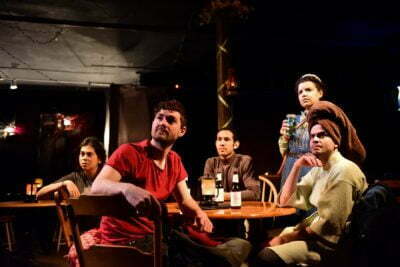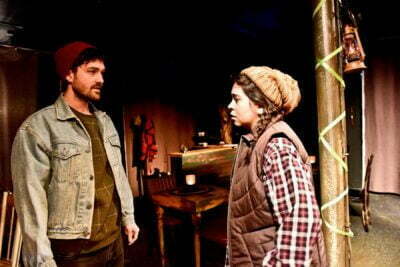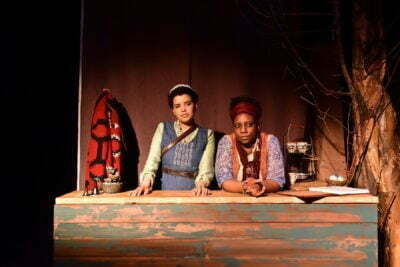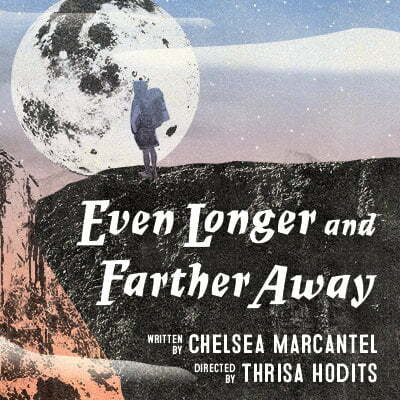Even Longer & Farther Away
By Chelsea Marcantel
Directed by Thrisa Hodits
Produced by The New Colony
At The Den Theatre, Chicago
A Story We’ve All Heard Before
The New Colony has a very in-depth, methodological approach to creating their own collaborative works, one that begins with a short story and character sketches and, over a period of four to six months, evolves into a full-fledged production. This means that all of their work is new and, as the Co-Artistic Director Evan Linder says, written by and for The New Colony ensemble.
Though I’m not sure of the exact process whereby Chelsea Marcantel’s Even Longer & Farther Away came about, if it was through such a collaborative process it doesn’t seem to have helped. A quintessential coming-of-age story about a young man on a quest for closure following the death of his father, Even Longer & Farther Away is shockingly shallow and transparent in its uninspired use of clichés and tropes—long stale and molded—that try one’s patience and credulity in their bland representation of emotional truth.

The story focuses on Elliot (Patriac Coakley), a youthful 30-year-old man who, at the dying request of his distant father, is hiking the Appalachian Trail to bury his father’s ashes at the top of Mount Katahdin, the one place he felt truly at home. Elliot never got to hike the trail with his father, so, for him, this journey is not only about closure but about finding connection with the father he never really felt he knew. Accompanying Elliot is Roy (Omer Abbas Salem), his boisterous best friend; and stalking behind them on the journey is Elliot’s estranged half-sister Alexis (Amanda Raquel Martinez) and her boyfriend Jack (Joe Lino) who pursue Elliot with one-half of their father’s ashen remains in the hope of forging some sibling relationship with him.
The play begins about 400 miles into the trek, when “the mountain” (non-ironic quotes) mysteriously leads them all to a “resort” (ironic quotes) whose proprietors are an old, mystical, story-weaving woman named Trudy (Deanna Reed-Foster) and her youthful-looking sister Nayda (Morgan McNaught). Elliot doesn’t care to rest or listen to Trudy’s stories (right there with ya’, brother!), but Roy and the others are tired and eventually convince him to stay the night. After all, tomorrow is the Spring Festival, which is the umpteenth year anniversary of when Nayda’s husband left her—plus, as Trudy tells Elliot, the mountain has brought him here for a reason.

The mountain (and Trudy) indeed know better than Elliot what he needs, and, after about a half-dozen stories, the stubborn-minded Elliot finally discovers the truth about his father and comes to forgive him and reconcile with Alexis—and the equally-stubborn Nayda, too, finally finds peace for her pining heart.
Everything neat and tidy, tied in a bow, and laid at our feet as enlightenment—no tangled conflicts, no residual resentments—just pure accord and a Spring Festival. Just like life.
Understanding that, as with them all, much time went into this production, one is discouraged to find so much to be disappointed in. Most of the responsibility here falls on Mercantel’s script: it is shallow, transparent, and singularly contrived. Not only does “the mountain” (and, by extension, Trudy) design against Elliot’s intended quest by magically confining him to the “resort” even after he tries to hike away, but Marcantel herself shows her author’s hand in how she manipulates the path of Elliot’s fate by spiriting away every interpersonal conflict that arises with either comedic diffusion or swift, mutual understanding. Herein, too, lies both the script’s shallowness and transparency: with their conflicts stamped out, Marcantel’s characters quickly become flat and uninteresting; and once I saw through their shallow souls, I saw plainly the easy inevitability of Elliot’s happy resolution. All the mystery and suspense of “How will he do ‘it’?” was melted into a weary anticipation of when he surely would and when I could finally leave.

The acting didn’t help much, either. With the exception of Omar Abbas Salem, who embraces his comedic supporting role with enthusiastic gusto, the other, more principal roles feel barely lived-in. I felt no history between Alexis and Elliot or even the older pair of siblings, Nayda and Trudy, who argue with each other more like polite strangers than sisters who have lived in close quarters for many years. Some of this is surely due to the limitations of the writing, but when I looked into the eyes of the young lovers, Alexis and Jack, all I saw were the blank stares of actors. Way on the opposite end of the spectrum, however, Deanna Reed-Foster, indulges in her character’s trope too heartily, and what begins as a hokey exaggeration of a mystical mountain woman, in the end crosses over into a caricatural farce.
Even Longer & Father Away is a fantastical quest of tropes in search of a cliché: the angry, young man gone native—accompanied by his comedic confidant, his young-but-mature sister, and her happy-go-lucky boyfriend—quests stubbornly for what he thinks he needs, but instead encounters a wise, mystical woman on a mountaintop whose perfectly felicitous stories lead him exactly to what he always really needed. We’ve all seen this story in one form or another, so why tell it again? With exactly zero unique twists or insights to offer, this play is unentertaining and eminently forgettable.
Not Recommended
August Lysy
Reviewed on 18 April 2016
For more info checkout the Even Longer & Farther Away page at Theatreinchicago.com
Playing at The Den Theatre, 1333 N. Milwaukee Ave., Chicago. Tickets are $20 – $25, with 25% discounts for students and seniors. Performances are Thursdays, Fridays and Saturdays at 7:30 p.m., and Sundays at 3 p.m. through May 15th (Additional performance on Monday, May 2nd at 7:30 2 p.m.). Running time is 100 minutes with one 15-minute intermission.

